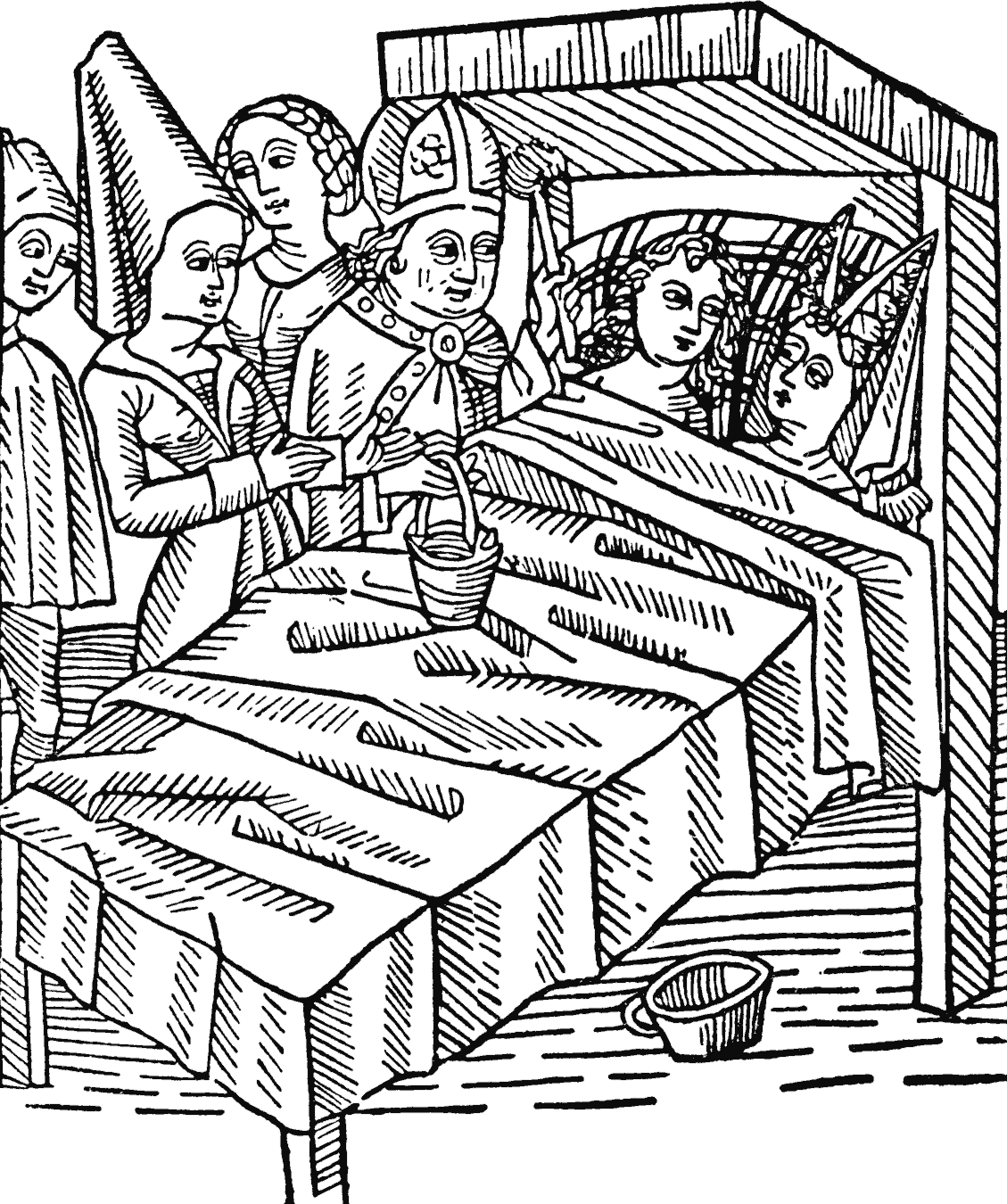 I'll admit it: I'm just plain confused about sex.
I'll admit it: I'm just plain confused about sex.I mean, people want the Church and the Government to stay out of their bedrooms, but they also want public recognition and protection for their sexual behaviors, such as lower ages of consent, free access to condoms and other contraception, and so on. The phrase "comprehensive sex education" seems to mean "focusing on contraception rather than the full workings human reproduction." I think the best example is the desire to get married, and also insisting on the right of no-fault divorce. (To those who see the same-sex marriage movement as a huge threat to marriage, I say: we haven't had that spirit here since 1969.) Honestly, I'm not quite sure what the point of marriage is when fornication is widely accepted or even encouraged, and divorce is an easy option at any time.
I'm also confused because friends of mine seem to want to keep their sex lives private, but at the same time want to define themselves according to their sexual behavior. This is most obvious in the "gay rights" movement, in which "coming out" is a sort of defining moment in a person's life: it's a public declaration of what someone does in his or her private life, which no one has a right to know or question, but which everyone must publicly acknowledge and support. It just seems kind of schizophrenic to me.
This has come home to me personally in recent days. I'm a Roman Catholic, and do my best to keep the moral teaching of the Church, i.e., sexual intercourse and behaviors belong within the marital relationship without exception. I'm not perfect, but I also make no excuses for my failures and I do my best to change my habits and behavior. Since college days, I've had lots of friends -- sometimes my closest friends -- who in one way or another have believed or acted differently from the Catholic teachings. Sometimes we'd talk about it, sometimes not. It didn't seem a big deal to me, not really my business.
But in the past year or so, I've had to face a number of people on exactly this issue. Some are people in active sexual relationships outside of marriage who nonetheless receive -- and even distribute -- communion in church. Some are people who are entering into marriage (or domestic partnerships) with unreliable people or for unwise reasons. I've heard of (though not witnessed myself) priests who advise couples to "try each other out" before marriage, or to explore same-sex attractions by engaging in same-sex intercourse.
More often than people in such situations come to me directly, mutual friends approach me to talk about them. It's hard to draw the line between commiserating or sharing advice and gossip in such situations. That's why I'm being so vague about persons and situations. But they ask me what to do, and they say things like, "We can't just talk to them about it." I reply, "Why not?" And they say, "But it's private." In other words, the "private" and "public" aspects of sex and marriage are interfering with each other, and are as confusing for other people as they are for me.
I don't have any final answers, of course. I don't advocate creating an equal sign between Roman Catholic teaching and U.S. law. At the same time, I believe that there is a natural law that describes the proper role of human sexual expression, and that should be reflected in the civil laws of every nation. I think it's no coincidence that every human culture has some kind of marital customs and regulations.
But I would begin by bringing the whole sex discussion out of the shadows. Let's talk about sex without euphemisms. Let's really look at what is public and what is private about sexual relationships, and why. It amazes me, for example, that in a class on fertility awareness methods, engaged couples should be so squeamish about diagrams of the genital organs, or of words like "cervix". I thought our culture was supposed to have been sexually "liberated"! And yet, one friend told me that she learned more about her own reproductive system from the introduction to a book on Natural Family Planning than she had from all the health and biology classes she'd taken in high school and college. That's a sign that we're not really talking about sex in a way that's accessible to all and freeing for the human person. If we want sexual liberation, I suggest we start with a self-critique of our own contradictions. I suggest that with sex, as with every other area of our lives, we begin with a clear understanding of reality.




2 comboxers:
Catching up.
I tend to agree with you on most of your points.
I think the point is that people tend to be weird in general about sex. And they always have been.
Personally, I don't get what the whole "out and proud" thing is about. My sexuality stays at home where it belongs. I don't mind the gay marriage movement because I get there are rights that go with marriage. Onthe other hand, I feel like it dominates current politics to an unnatural degree.
VT just revisited the issue* again* - this time all we did was change the names on forms. No actual extra rights where conveyed. Yippee, there was a feel good victory. (Actually, that's all it was.)
I also get the unsettling sense that some modern homosexuals want their lives to mimic some sort of "Leave It to Beaver" life or have their sexual preference "normal".
Tolerance is one thing, but given that they are 10% of the population at most, it's never going to "normal", simply by sheer numbers. In one generation we've gone from "just happy to not be beaten up" to "I *deserve* a normal life". Like anyone is entitled to a "normal" life, regardless of who they choose to sleep with.
Some of the most intelligent, motivated people I have ever met are gay. I would never take gay marriage away from them, nor would I ever feel their marriages did anything to lesson mine.
On the other hand, the gay rights victories feel hollow to me. IMO, women's and civil rights were by far more important victories, impacting a far larger portion of the population. *shrug*
R wrote: I'm also confused because friends of mine seem to want to keep their sex lives private, but at the same time want to define themselves according to their sexual behavior. This is most obvious in the "gay rights" movement, in which "coming out" is a sort of defining moment in a person's life: it's a public declaration of what someone does in his or her private life, which no one has a right to know or question, but which everyone must publicly acknowledge and support....
I agree that this is inconsistent, but I suspect that it arose from the intersecting of several cultures and subcultures. And such collisions often produce inconsistency (much as the collision of several languages in Britain produced English).
For example, back in the 1980s, the gay subculture was extremely public about certain things (cf. the Gay Pride parades of the time), but only within specific limited geographic areas. As "coming out" became more socially acceptable, the geographic area became wider while the degree of specificity in sharing details became shallower. Which is fine with me.
But the other culture that contributed is traditional upper-class marriage. In traditional upper-class marriage, the entire world knew the name of the one person you were sleeping with and hoped to have children with (your wife). In other words, there was a public element involved, and a publicly understood but not discussed sexual element (all the guests at a wedding expect the bride and groom to have sex, but this is not discussed). Indeed, people could ask "Do you hope to have more children?", but no one would ever dream of asking "Do you plan to have sex with your wife tomorrow night?" At the same time, in an upper-class world, only your close friends knew the name of the other person you were sleeping with (your mistress).
Which leads to bizarre combinations. For example, the longest-serving president of the United States, Franklin Roosevelt, was one of the most famous men in the world, and beloved by many Americans, as was his wife. Yet the fact that he was in a wheelchair was kept moderately secret, and the fact that the only woman he truly loved was his mistress was known only to half a dozen people. He died at his mistress' house and the family hushed this fact up immediately.
So when these two cultures collided, the question quickly became: if my son or daughter has a homosexual partner, should this be mentioned in polite company (like a wife) or kept quiet (like a mistress)?
Post a Comment